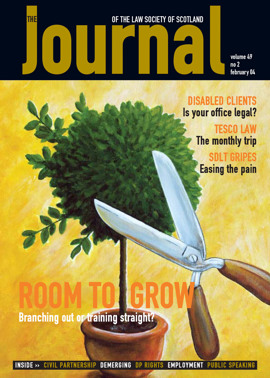Show us the evidence!
A new EU Regulation (Council Regulation (EC) 1206/2001) on co-operation in the taking of evidence in civil or commercial matters came into effect on 1 January 2004. This substantially streamlines the letter of request procedure where the other country involved is a member state (except Denmark, which does not participate in EU Justice and Home Affairs projects). It replaces the Hague Convention on the Taking of Evidence Abroad in Civil or Commercial Matters between the Member States in relation to matters covered by both instruments.
From 1 January, a request for evidence will go directly from the Scottish court to a designated court in the other member state, cutting out the transmission via central authorities under the Hague Convention. Each country is to specify a limited number of courts to receive incoming requests. In Scotland, the head courts of each sheriffdom have been nominated. A full list of designated courts is available on the European Commission website, as is the text of the Regulation itself. Hopefully a more user-friendly version of the court details will be available shortly.
The new direct transmission method reflects the desire for member states to have increased trust in each others’ judicial procedures. A network of central authorities will be retained, to supply information to their courts and seek solutions acceptable to both countries in difficult cases. Scottish Executive Justice Department will continue to act as the Scottish central authority.
The Regulation imposes time limits for each stage of the process, from acknowledgment by court staff of receipt of a request to completion. Under article 10, a request is to be executed within 90 days of receipt. At present, a request to Scotland results in a petition to the Court of Session, which then appoints a sheriff principal to deal with the case. The removal of this stage should enable swifter execution.
Another innovation is the power for a requesting court to seek to take evidence directly, for example by video link, rather than through a judge in the country addressed (article 17). This is only competent where the evidence can be taken without the need for coercive measures. Such a request must be submitted to the central authority, which may impose conditions. The Scottish central authority will be seeking to liaise closely with the relevant sheriff principal as soon as such a request is received. Even where the evidence is not being taken directly, the parties, their representatives and representatives of the requesting court may have the right to attend and to participate in the proceedings under articles 11 and 12, although limits to participation may be set by the requested court.
A new Act of Sederunt (SSI 2003/601) contains procedures for the handling of both incoming and outgoing requests. The Scottish central authority is happy to answer queries, which should be addressed to: Louise Miller/Laura Mulheron, Scottish Executive Justice Department, EU JHA and International Team, 2nd Floor West, St Andrew’s House, Regent Road, Edinburgh EH1 3DG (tel 0131 244 4823/9; fax 0131 244 4848; email Louise.Miller@scotland.gsi.gov.uk; Laura.Mulheron@scotland.gsi.gov.uk)
In this issue
- It's a funny old world
- Making the ends of justice meet
- Training for growth
- All the grocer's grandchildren
- Radical change or a lie in law?
- Costing the job
- Are you listening?
- Much ado about nothing?
- Demergers and continuing cover
- Bond with the audience
- Many roles, one team
- Fee sharing: making the rules work
- On sentencing
- Credit reform by instalments
- Scottish Solicitors' Discipline Tribunal
- Show us the evidence!
- A new era for farm tenancy law
- Fathers' rights: a new UK postcode lottery?
- Parallel imports: putting on the brakes
- Website reviews
- Book reviews
- SDLT 1: Over the obstacle course
- SDLT 2: Personal presentation
- The new law of real burdens
- Housing Improvement Task Force






